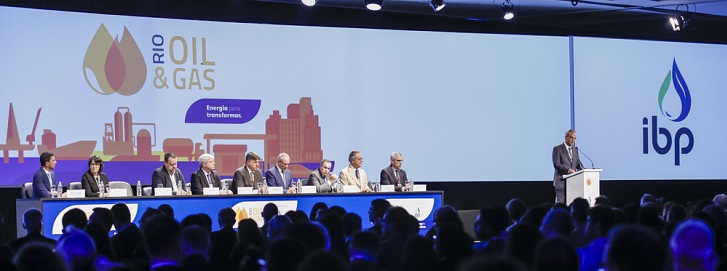Rio Oil & Gas 2018 discusses the new era of the oil industry

International authorities and speakers mark the opening of the event
Rio de Janeiro, September 24, 2018 – The 19th edition of Rio Oil & Gas began with discussions around the current scenario of the industry and focus on the energy transition. Authorities and big names of the industry have restated the need to develop a sense of urgency to attract investment and improve the Brazilian economy.
In the opening session, the president of the Brazilian Institute of Oil, Gas and Biofuels (IBP), José Firmo, said that the oil & gas industry is undergoing a transitional stage that opens up space to leverage the sector and highlight the benefits that the country may reap. According to the Executive, it is necessary to take advantage of the moment of energy transition with “a sense of opportunity to convert reserves into wealth”.
Firmo also pointed out that if adjustments are introduced, it is possible to increase oil and gas production to 6.3 million barrels per day, generating 400 thousand new jobs and raising R$ 6 trillion for the country. “Brazil needs to be competitive and invest in planning and management to take advantage of this era”, he said.
The focus on the window of opportunity in the sector and the changes that lie ahead were also highlighted in the speeches of the Executive Secretary of the Ministry of Mines & Energy, Márcio Félix, and ANP’s Director General Decio Oddone. According to Márcio Félix, it is important to evolve in issues such as gas and ensure the continuance of the ongoing changes. Décio Oddone pointed out that, maintaining the regulatory developments, the country’s estimated investment is R$ 250 billion per year until 2030. “In order to reach this figure, we need more companies and a competitive market to attract investments and generate benefits for society”, Oddone said.
The new geopolitics and the energy transition
The global scenario with large-scale shale production by the United States and China’s energy demand, the world’s largest energy consumer, were also highlighted at the congress. In the panel “The New Oil & Gas Geopolitics”, Kenneth Medlock, senior director of the Center for Energy Studies at the Baker Institute (USA), stated “the US acknowledged the key role of energy and managed to shift its position from importer to exporter. Thus, they became a top energy producer”. Medlock also stressed that the geopolitical issue of producing countries has determined the dynamics of energy imports. “The world is looking for a safe supply based on trade and geopolitics”, he said.
A senior analyst at the International Energy Agency, Toril Bosoni, pointed out that it was the geopolitical instability that led to reduced production in countries such as Venezuela, Mexico, Nigeria and Libya. Fareed Mohamedi, director of the SIA Energy International, pointed out that the administration of US President Donald Trump has raised tension in the Middle East and expressed concern about how the rest of the world will deal with the sanctions of the Americans to the Middle East.
Toril Bosoni also warned of the impact of electric vehicles, which has been changing the energy matrix of the future. “By 2025 we will have 50 million electric vehicles. The projection for 2040 is 300 million, which is very significant.”
The significant transformations that have been taking place in the current global energy matrix were also addressed during the speech given at lunchtime “Challenges and opportunities of the upstream sector in a changing world”. Shell’s upstream international director Andy Brown highlighted future trends, as governments will increasingly have to commit to reducing CO2 emissions, the growing presence of electric cars and the shift in consumers’ mindset.
“For the oil & gas industry, it is not about surviving the energy transition, but about thriving and growing in the meantime. It is therefore extremely important that companies turn their attention to the added value of their products”, Brown said.
Another aspect introduced by the executive was the digitalization as a value-generating factor to the Upstream area. According to Brown, new technologies are crucial to improving processes, as well as helping the industry at this great moment of transformation. “We are an industry in which data is part of our core business. It is amazing how much can be extracted from processes such as machine learning. The current challenge is how to promote innovation”, he said.
Rio Oil & Gas will be held until Thursday (27), with five thematic blocks that will address Exploration and Production, Downstream, Gas & Energy, Supply, Industry Management, and Digital Technologies. Eleven parallel events will take place, bringing together specialists in technology, sustainability, SMS (Health, Environment and Security), certification, exploration, downstream and professional development.
The complete schedule can be accessed through the portal www.riooilgas.com.br or through the App, available for download at Google Play or the App Store.